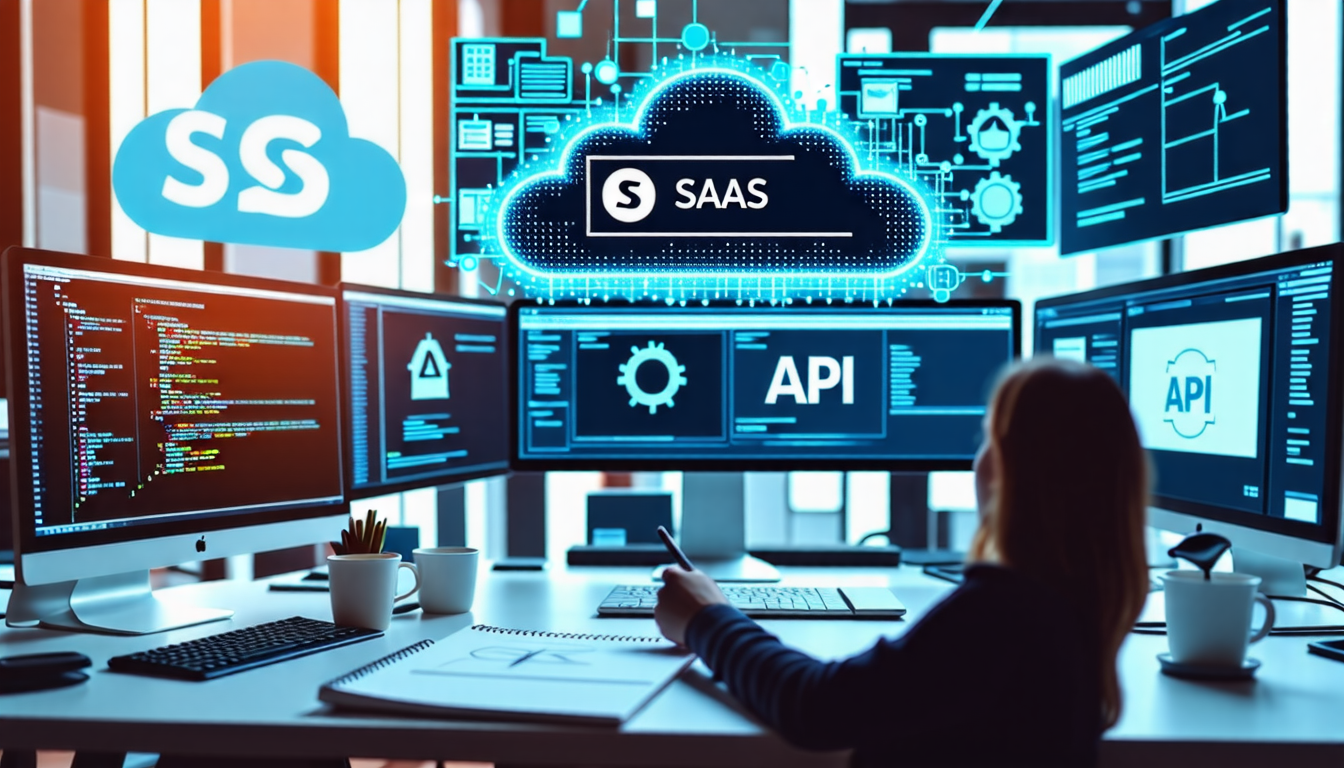|
IN BRIEF
|
In the rapidly evolving landscape of software development, the integration of Software as a Service (SaaS) has become essential for enhancing API capabilities. SaaS platforms transform the way developers interact with APIs by providing flexible solutions that enable seamless data sharing and functionality across different applications. This environment not only promotes scalability but also fosters automation and integration, empowering businesses to innovate and respond to market demands effectively. As organizations seek efficient means to streamline operations, understanding the crucial role of SaaS in modern API development is increasingly vital.

The rise of Software as a Service (SaaS) has fundamentally transformed how businesses approach API development. This article delves into the critical relationship between SaaS and API integration, elucidating the benefits that this synergy brings to modern software solutions. From enhancing flexibility and scalability to enabling seamless integrations across various platforms, the role of SaaS in API development is both significant and multifaceted.
Table of Contents
ToggleThe Importance of API Integration in SaaS
API integration serves as the backbone of modern SaaS applications, allowing different software systems to communicate and share data and functionalities efficiently. This connectivity is paramount for businesses looking to streamline their processes and enhance the user experience. By facilitating seamless data exchange between applications, API integration helps ensure that businesses can adapt quickly to changing demands and market conditions.
SaaS Architecture and API Operations
The architectural design of SaaS solutions plays a crucial role in how APIs function. SaaS allows developers to focus on core functionalities rather than the underlying infrastructure. This approach fosters rapid development and deployment cycles, enabling businesses to roll out new features and updates faster than ever. By leveraging cloud-based technology, developers can create robust APIs that enhance the capabilities of their SaaS products without significant overhead costs.
Benefits of SaaS API Architecture
Utilizing a SaaS API architecture delivers numerous benefits. Developers can integrate third-party features into their applications, diminishing the need for building everything from scratch. This capability not only speeds up the development process but also allows businesses to deliver a more feature-rich experience to their end-users. Additionally, the automated nature of SaaS APIs ensures that these integrations operate smoothly, reducing potential disruptions in service.
API-Centric SaaS: A New Wave in Software Solutions
API-centric SaaS, often referred to as Headless Software as a Service, represents a paradigm shift in how applications are built and utilized. This model emphasizes a separation between the backend services and the frontend interface, allowing for greater flexibility in how users interact with the software. By allowing access through programmatic requests or event-based APIs, businesses can customize their offerings more efficiently, ensuring a more tailored experience for the user.
Enhancing Customization and Flexibility
Through SaaS integration, organizations can create highly customized environments that cater to specific user requirements. The flexibility offered by APIs enables companies to modify their applications without the need for extensive reconfigurations. This cost-effective approach is particularly beneficial for businesses looking to scale efficiently without sacrificing quality or user experience.
The Evolution of SaaS and API Development
As the landscape of technology continues to evolve, SaaS solutions are increasingly seen as essential components of modern business strategy. The integration of APIs allows companies to evolve their software offerings to meet user needs and industry standards. Moreover, with the growing emphasis on data security and compliance, understanding how APIs work within the SaaS framework is more important than ever.
Implementing Effective SaaS Integration Strategies
Effective SaaS integration strategies hinge on a robust understanding of API functionalities. Knowledge of critical endpoints and how they interact within the overall architecture is crucial for IT management. Companies that prioritize seamless integrations tend to see enhanced performance and productivity across their business processes. By focusing on strategic implementation, organizations can maximize the benefits of their SaaS solutions.
The Future of SaaS in API Development
The trajectory of SaaS and API development suggests a future that increasingly relies upon interoperability and seamless connections across platforms. As businesses seek to leverage data more efficiently, the role of APIs will continue to expand, making it imperative for companies to stay ahead of emerging trends. With a focus on automation, scalability, and user-centric design, the future of SaaS will undoubtedly redefine how software solutions are developed and delivered.
For those looking to dive deeper into the specifics of SaaS and API integration, resources are available. Articles such as SaaS, SOC, and API: Technology Terms for Modern Tech Stack and How to Integrate SaaS Applications provide valuable insights into optimizing these powerful tools for maximum impact.
| Aspect | Description |
| Integration | SaaS enables seamless integration of various applications through standardized APIs. |
| Scalability | API-based SaaS solutions offer flexibility to scale applications as needed without significant overhead. |
| Customization | SaaS platforms allow for enhanced customization through APIs, catering to unique business requirements. |
| Automation | APIs facilitate automation of routine tasks, improving efficiency and reducing manual errors. |
| Development Efficiency | Using pre-built APIs accelerates the development process, allowing developers to focus on core features. |
| Data Security | SaaS solutions employ robust security measures through APIs, ensuring safe data exchange. |
| User Experience | APIs enhance user experiences by providing smooth interactions across different platforms. |
In today’s rapidly evolving technological landscape, Software as a Service (SaaS) plays an integral role in the development and integration of Application Programming Interfaces (APIs). This article delves into the critical functions SaaS provides, focusing on how it transforms API operations, enhances scalability, and fosters seamless integration among diverse applications. By grasping the interplay between SaaS and APIs, businesses can harness the full potential of their software ecosystems.
Seamless Integration through API Connectivity
API integration enables various software applications to communicate effectively, facilitating the sharing of data and functionalities. SaaS serves as a catalyst in this regard, allowing businesses to connect multiple tools and services effortlessly, whether cloud-based or on-premises. It provides a framework where different systems can work in harmony, improving overall operational efficiency.
The Transformative Power of SaaS in API Operations
As technology progresses, the role of SaaS in API orchestration has become increasingly significant. SaaS simplifies the complexities of API management, making it easier for developers to focus on core functionalities rather than the underlying infrastructure. Benefits such as enhanced scalability, automation, and a product-oriented approach are just a few reasons why companies are leaning towards SaaS solutions.
Enhancing Development Through SaaS APIs
SaaS APIs offer a unique advantage for developers, enabling them to incorporate advanced features into their applications without the need to build everything from scratch. This API-centric SaaS model promotes flexibility and convenience, allowing teams to concentrate on their primary objectives while still benefiting from a rich array of functionalities. With this structure, SaaS can dramatically accelerate the development cycle.
Scalability: The Key to Growth
One of the noteworthy features of SaaS is its ability to scale effortlessly. As a business expands, the tools it uses must adapt accordingly. This is where SaaS integration shines—allowing organizations to grow sustainably by integrating new applications and functionalities as their needs evolve. The ease of quick deployment is a valuable asset for any business looking to maximize efficiency.
Security and Compliance in SaaS API Development
In an era where data security is paramount, SaaS solutions often offer enhanced protective measures. This includes built-in compliance with regulations and sophisticated security protocols that third-party applications may not provide. By leveraging SaaS for API development, businesses can ensure that their integrations are not only effective but also secure and compliant with industry standards.
The Future of SaaS and API Interoperability
Looking ahead, the relationship between SaaS and APIs is set to deepen, with increased focus on interoperability—the ability of different software applications to work together seamlessly. As the demand for integrated solutions rises, businesses that harness the power of SaaS in their API strategies will be well-positioned to remain competitive in the digital landscape.
- API Integration: Connects various applications for seamless data sharing.
- Transformative Power: SaaS reshapes API operations and orchestration.
- Scalability: Facilitates growth by allowing applications to expand quickly.
- Customization: Enables tailored experiences through flexible platforms.
- Automation: Streamlines processes, enhancing efficiency and speed.
- Product-thinking: Encourages developers to focus on core functionalities.
- Accessibility: Cloud-based services make software available anytime, anywhere.
- Cost Efficiency: Reduces development costs by leveraging existing APIs.
- User Experience: Improves interactions with integrated services and features.
- Interoperability: Bridges different platforms, enhancing collaboration.
In the contemporary landscape of software development, Software as a Service (SaaS) has emerged as a pivotal element in the evolution of Application Programming Interfaces (APIs). This article elucidates how SaaS is transforming API practices, enhancing integration, and fostering scalability, ultimately leading to a more dynamic and efficient software ecosystem.
The Transformation of API Operations through SaaS
SaaS has revolutionized the way APIs operate by enabling seamless connectivity between various software applications. With robust API integration, different systems can communicate effectively, allowing for data exchange and functionality sharing. This seamless interaction is essential for organizations looking to streamline their processes and enhance user experiences.
Modern API development heavily relies on SaaS models, which facilitate automation and orchestration. By utilizing SaaS platforms, developers can focus on creating robust applications while leveraging pre-built APIs instead of building from scratch. This significantly accelerates the development process and allows for quicker deployments.
Importance of Scalability and Flexibility
One of the most notable advantages of SaaS in API development is its scalability. Traditional software models often struggle with expanding data and user demands, but SaaS solutions are designed to accommodate growth effortlessly. This inherent scalability empowers businesses to adjust their resources according to varying workloads, subsequently improving operational efficiency.
Moreover, SaaS platforms are characterized by their flexibility. As companies evolve, so do their technological needs. SaaS APIs provide the customization options necessary for organizations to adapt their applications according to user feedback and emerging market trends, thereby enhancing overall user satisfaction.
Enhancing User Experience through APIs
APIs play a crucial role in improving the user experience of SaaS applications. By granting access to third-party developers, SaaS platforms allow the integration of innovative features and functionalities without the need for extensive in-house development. This approach enables businesses to stay competitive by offering unique services that address specific customer needs.
With APIs, users can engage with software in a more meaningful way, streamlining their interactions and allowing for greater engagement with products. The improved user experience ultimately leads to higher client retention and loyalty, which is vital for business growth.
Addressing Challenges in SaaS API Development
Despite the numerous benefits that come with SaaS API integration, challenges remain. Ensuring data security and compliance continues to be a significant concern for organizations leveraging SaaS solutions. As businesses rely more on external applications, safeguarding sensitive information and adhering to regulations are paramount.
Additionally, effective SaaS integration strategies must be developed to bridge interoperability gaps between different platforms. This requires careful planning and execution to minimize disruptions during the integration process. Companies should invest in thorough testing and validation to ensure the robust functionality of their APIs.
The Future of API Development with SaaS
As technology advances, the role of SaaS in API development is set to expand. New trends in cloud computing, including AI and machine learning, will likely further enhance the capabilities of SaaS APIs. These innovations promise to streamline processes and drive productivity, opening up new opportunities for businesses worldwide.
In summary, SaaS plays a transformative role in modern API development by fostering integration, scalability, and improved user experiences. As organizations continue to embrace this dynamic model, they will be better equipped to navigate the complexities of the digital landscape and achieve long-term success.
FAQ on Understanding the Role of SaaS in Modern API Development
What is SaaS?
SaaS, or Software as a Service, is a cloud-based software delivery model that allows users to access applications over the internet, eliminating the need for local installations.
How does SaaS contribute to API development?
SaaS enhances API development by providing a flexible infrastructure that supports rapid integration, scalability, and automation, enabling developers to create and manage APIs efficiently.
What are the benefits of using SaaS APIs?
Utilizing SaaS APIs allows developers to incorporate additional features and functionalities into their applications without extensive in-house development, leading to faster time-to-market and reduced costs.
Can SaaS platforms be customized?
Yes, SaaS platforms are designed to be flexible, allowing for customization and personalization which enhances user experiences by meeting specific business needs.
Why are APIs important in SaaS?
APIs play a crucial role in SaaS as they facilitate seamless communication between different software applications, making the platform more adaptable and improving overall functionality.
How do SaaS and API integration improve scalability?
The integration of SaaS and APIs enables businesses to scale their operations rapidly by simplifying the process of connecting new software tools and services as demand grows.
What is the future of SaaS in API development?
The future of SaaS in API development lies in continuous innovation, where the evolving technology landscape will drive more efficient integrations and improve user experiences.





